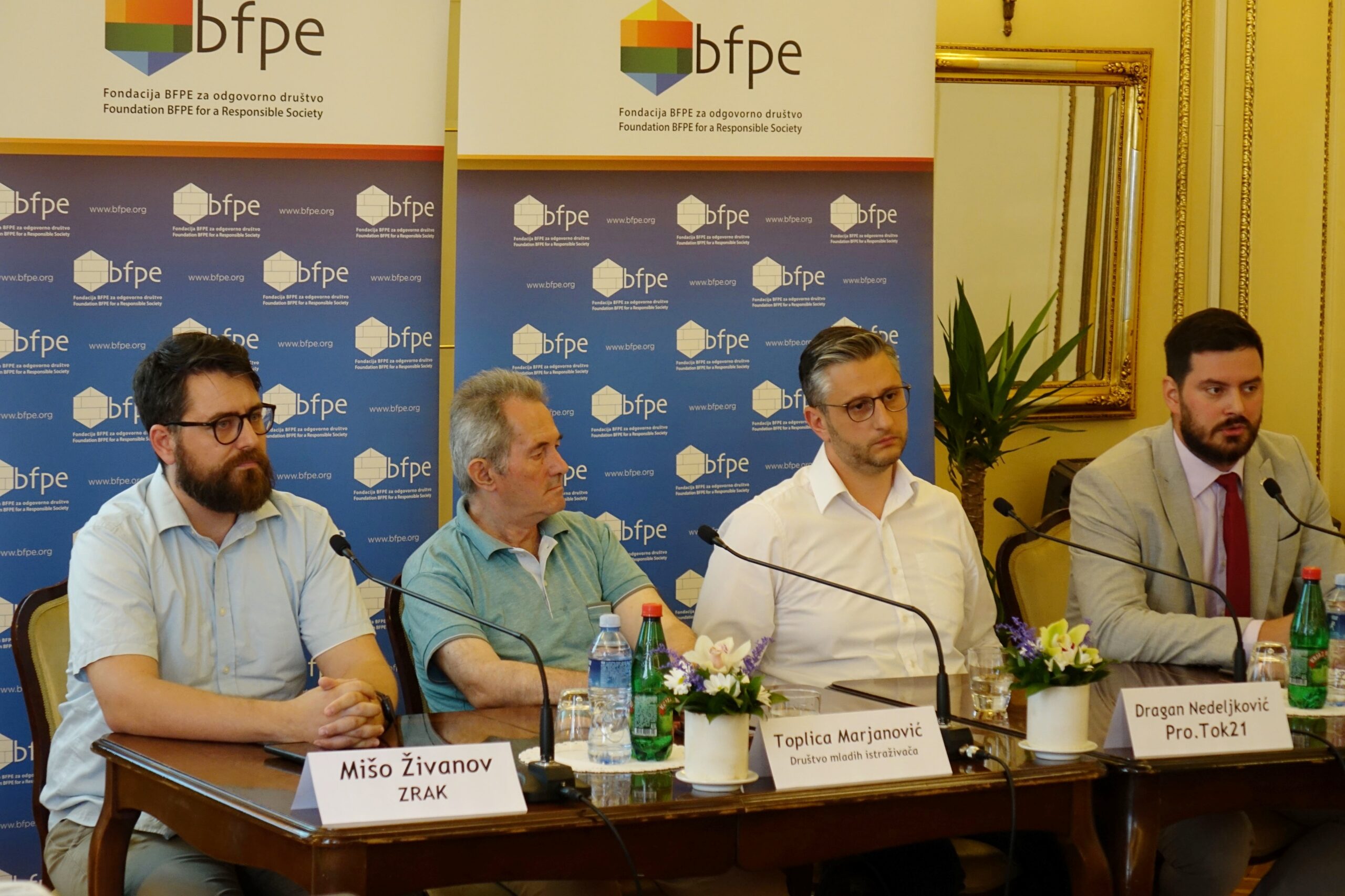The conference ” China in Our Yard: Understanding China’s Authoritarian Influence ” was held on May 25, 2022 at the Aeroclub, Uzun Mirkova 4 / II, Belgrade.
The participants of the first panel were representatives of local activist organizations from Smederevo, Bor and Zrenjanin, while the panel was moderated by Stefan Vladisavljev, program coordinator at the BFPE Foundation for Responsible Society. The topic of the first panel was the re-examination of Chinese influence at the local level. Dragan Nedeljković, on behalf of the organization Pro.Tok 21 from Smederevo, pointed out that we should not even talk about the environmental problems that arise from the business of the Smederevo Ironworks, because everyone knows what is happening there. He pointed out that Zelezara has always been a socially responsible company, but that today the Zelezara’s investment in the community is proportionally zero, except for some small arrangements with the Technical School. He concluded that dialogue between the local community, investors and the state is needed to overcome the problem. Toplica Marjanović, on behalf of the Association of Young Researchers from Bor, says that “the city of Bor has become a city between two mines”. He pointed out that the biggest problem is environmental protection, and that pollution with both sulfur dioxide and heavy metals is growing. He pointed out that the phrase green mining is often heard, but that it is not in the local community. He believes that sustainable mining does not exist since non-renewable resources will disappear, so he believes that we should talk about a sustainable community. Mišo Zivanov, a representative of the Zrenjanin Action, pointed out the problematic nature of the assessment of the study on the feasibility and environmental impact of the Linglong factory in Zrenjanin. Public hearings were not held in accordance with the law, as citizens were unable to attend. He pointed out the problem of human rights of Vietnamese workers who are employed in the company Linglong, as well as that the laws exist but are not applied, but also that there is no one to sanction those who violate them.
The second panel referred to the impact of the Chinese presence on the state of democracy in Serbia. Stefan Vladisavljev initially pointed out 3 phases that characterize the cooperation between China and Serbia: the period from 2009 to 2016 when we have cooperation at the level of loans and infrastructure projects, the period from 2016 to 2020 when there is an increase in foreign direct investment, and the period after 2020, which is characterized by the consequences of cooperation in the fight against the pandemic. Bojan Klačer, on behalf of CESID, presented the parameters that affect the attitude of public opinion towards China and other actors, such as: further and closer history, whether or not there were war conflicts, whether there is ethnic distance, relationship according to the war in SFRY, as well as NATO intervention in Kosovo. According to research conducted by CESID, it further indicates that 77% of citizens believe that China has a positive impact on Serbia. Vujo Ilić, on behalf of CRTA, believes that there is a strong connection between the authoritarian values of China and Serbia, that it is a complex relationship, and that it is more about enabling autocratic influence than direct Chinese influence. He points out that China does not offer a clear model either globally or in Serbia, but also that China’s path cannot be replicated in another country, but rather that it can contribute to Serbia’s distance from the West. Nevena Šekarić, research associate at the Institute for International Politics and Economy, pointed out that many EU member states cooperate with China, such as Germany, Italy and France, and that there is no necessary connection between economic cooperation with China and deviation from the European path. He believes that when it comes to soft power, the soft power of the European Union is unquestionable in relation to the soft power of China, but also that China cannot be an alternative to the European Union.
The participants in the conference agree that there is a need for a broader dialogue when it comes to cooperation between China and Serbia. It is necessary to take into account the interests of the local community, and work on networking local actors. It is important that representatives of the local community, the investor and the state are involved in this dialogue in order to solve existing and potential problems, but also that transparency and consistent compliance with the law is necessary. The discussion pointed out the existence of empty space in Serbia after 2016, and that this space was filled by China, since Serbia did not make enough progress towards the European Union, while the European Union was preoccupied with other topics. The European Union is an important option when it comes to Serbia, but that does not mean severing relations with China. It is important to point out that China can provide good models of cooperation and that cooperation with China does not have to be bad.













